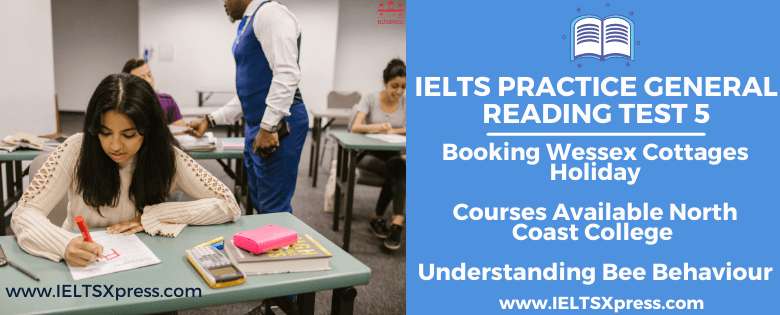IELTS General Reading Practice Test 5 with Answers | Booking a Wessex Cottages Holiday | Courses Available at North Coast College Campuses | Understanding Bee Behaviour
Reading Passage 1
Questions 1-14
Read the information below and answer Questions 1-7
Booking a Wessex Cottages Holiday
How to book your holiday
When you have looked through our brochure and have chosen two or three alternative cottages you would like to stay in, please phone our Holiday Booking Office.
The number is: 01225 892299
31st March to 20th October
Monday, Tuesday, Wednesday, Friday 9.00 a.m. to 5.00 p.m. and Thursday 9.30 a.m. to 5.00 p.m.
Saturday Closed
Sunday Closed
21st October to 30th March
Monday, Tuesday, Wednesday, Friday 9.00 a.m. to 5.00 p.m. and Thursday 9.30 a.m. to 5.00 p,m.
Saturday 9.30 a.m. to 4.30 p.m.
Sunday Closed
We will check the availability of your choices and our reservation staff will help you make your decision. Should none of your choices be available, we will do our best to suggest suitable alternatives.
When a provisional reservation has been made, it will be held for 7 days. We will give you a holiday reference number and ask you to complete the holiday booking form and return it, with a deposit of ONE THIRD of the cottage rental, to:
WESSEX COTTAGES HOUDAY BOOKING OFFICE PO BOX 675
MELKSHAM
WILTSHIRE SN12 8SX
Deposit payments can be made by credit card at the time of booking or by cheque made payable to: Wessex Cottages Ltd.
IF WE HAVE NOT RECEIVED YOUR COMPLETED AND SIGNED BOOKING FORM WITH DEPOSIT
WITHIN 7 DAYS, WE REGRET THAT YOUR RESER VATION WILL BE CANCELLED.
When we receive your booking form and deposit, your reservation will be confirmed – we will send you a Booking Confirmation, together with advice on how to reach your holiday cottage and the telephone number or a local contact should you require further details on the cottage before leaving home. Attached to the Booking Confirmation will be a note showing the balance due on your holiday and the date by which it is payable. Outstanding balances on bookings made in the UK must be settled within 10 weeks of sending the deposit.
ARRIVAL
Please do not arrive at your holiday cottage before 3.30 p.m. or later than 7.00 p.m.
DEPARTURE
On the morning of departure, please leave your holiday property by 10 a.m. to allow caretakers sufficient time to prepare the properly for the next visitors. We ask that you please leave the property as you found it. Please don’t move the furniture as this can cause damage both to the furniture and to the property.
OVERSEAS BOOKINGS
We are delighted to take bookings from overseas visitors either by telephone or fax +44 (0)1225890227. All payments should be made by credit card or by cheque in Pounds Sterling. Please note that provisional bookings from overseas visitors will be held for 14 DAYS. If the completed and signed booking form with the deposit is not received within that time, the reservation will be cancelled.
LAST-MINUTE BOOKINGS
If you wish to make a last-minute booking, please telephone the Holiday Booking Office to check availability.
If your reservation is made within 10 weeks of the holiday start date, full payment is due on booking.
ELECTRICITY
In most Wessex Cottages properties electricity must be paid for in addition to me holiday price. You may be asked to take a meter reading at the conclusion of your holiday, or an additional fixed charge for electricity may be made. Alternatively, there may be o coin meter, in which case you will be advised when you are making your booking. In some cottages, electricity is included in the rental and in very few there is no electricity at all.
LINEN
In most Wessex Cottages properties you have the choice either of hiring linen, at a cost of £6.00 per person per week, or of bringing your own. In some cottages linen is included and in a very few it is not available at all. if you choose to hire linen, it will include bed linen (i.e. sheets and/or duvet covers and pillow cases), bath and hand towels and tea cloths but will not include towels for swimming or beach use. Linen is not available for cots. If you have any queries, do ask the Holiday Booking Office.
Questions 1—7
Look at the information above about renting holiday cottages in England
Do the following statements agree with the information given in the passage?
In boxes 1-7 on your answer sheet write
TRUE if the statement agrees with the information
FALSE if the statement contradicts the information
NOT GIVEN if there is no information on this
1. The office is open on Saturdays in February but closes slightly earlier than on weekdays.
2. On receipt of your deposit, Wessex Cottages will confirm your booking by telephone.
3. For UK bookings, any outstanding balance must be paid within ten weeks of sending the deposit.
4. Between the departure of one visitor and the arrival of the next, the properties are visited and made ready.
5. The cost is lower if you make a last-minute booking.
6. Electricity is included in the rental of the majority of Wessex Cottages properties.
7. Beach towels are available for hire.
Read the advertisements below and answer Questions 8-14.
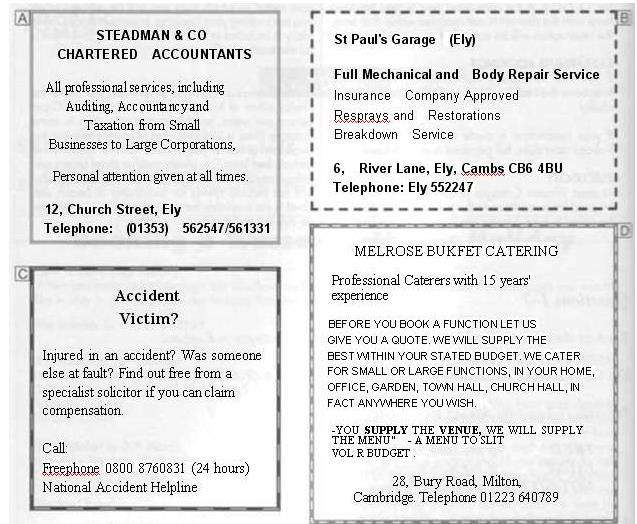
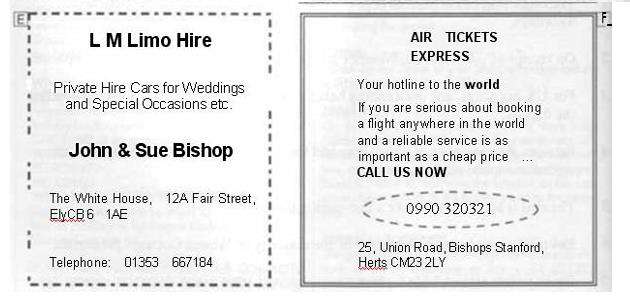
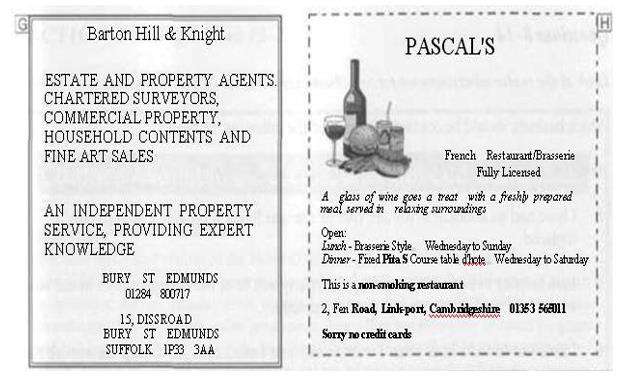
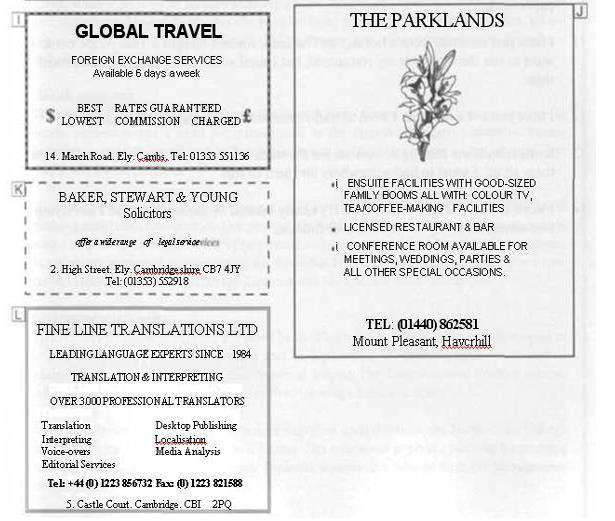
Questions 8-14
Look at the twelve advertisements for local businesses A-L on the previous pages.
Which business should be contacted in each of the following situations?
Write the correct letter A-L in boxes 8-14 on your answer sheet.
8. I have had an accident in my car. One of the rear lights is broken. I need to have it replaced.
9. I am helping to organise a wedding. The party will be at the bride’s family’s house but we are looking for someone to provide the food.
10. I have just found a house that I want to buy and I need a lawyer to help me with all the paperwork.
11. I have just returned from a holiday in Thailand, where I bought a Thai recipe book. I want to use the recipes in my restaurant, but I need someone to help me understand them.
12. I have just got a new job. I need to find somewhere to live locally.
13. Some friends are coming to visit me for the weekend, but my house is too small to put them all up. I want to find somewhere for them to stay.
14. I work in a local firm of solicitors. It’s nearly the end of the tax year and I am trying to find someone to help us organise our finances.
Reading Passage 2
Read the passage below and answer Questions 15-21.
Courses Available at North Coast College Campuses
Agriculture
Specialist agriculture centres of the North Coast College offer courses ranging from agricultural skills to beef production, horse studies and rural management. The Wollongbar Campus is renowned for its Tropical Fruit Growing program and has introduced modules on macadamias, bushfoods and coffee production. Taree offers the Veterinary Assistant program and has introduced `Agristudy’, which enables students to learn flexibly and by correspondence, using a mixture of ‘student learning guides, telephone tutorials, information sessions and workshops. Mullumbimby has the popular Rural Business Management program, which can also be studied by correspondence. Grafton, meanwhile, offers traineeships in agriculture including Beef and Dairy.
Health programs
The continued promotion of healthier living within the community has seen an increase in fitness awareness and a need for trained staff in the Fitness and Sport industries. Fitness Instruction courses are offered at Tweed Heads and teach students how to put together and lead a safe fitness program.
Lismore offers the Aged Support program and Port Macquarie offers the Early Childhood Nursing program. These courses give you the theoretical skills, knowledge and practical experience needed to work in a variety of residential and community-based health care institutions. For students interested in working in the Remedial Health Care industry, Kingscliff is a specialist centre for the Natural Therapy Diploma and has a health clinic on campus.
Environmental Studies
The Environmental Studies courses offered by the North Coast College have been developed to help students increase their awareness and understanding of environmental issues and to enable them to determine their environmental impact. The Environmental Practice course, which includes Coastal Management, is offered through Ballina campus.
For people interested in working to restore degraded natural forests, the North Coast College offers the Forest Regeneration course at Casino. This course can provide a pathway for students into the Natural Resource Management Diploma at university. Marine Industry Management programs are offered at Coffs Harbour.
Questions 15-21
Look at the following list of campuses (Questions 15 21) and the fields of study below.
Match each campus with the field of study available there.
Write the correct letter A-K in boxes 15-21 on your answer sheet.
15. Wollongbar
16. Grafton
17. Tweed Heads
18. Lismore
19. Port Macquarie
20. Ballina
21. Coffs Harbour
Fields of Study
A forest restoration
B banana cultivation
C horse breeding
D infant illness
E elderly care
F fish farming
G herbal therapy
H cattle farming
I beach protection animal health recreation programs
J animal health
K recreation programs
Read the passage below and answer Questions 22-27.
Information on Photocopying
In Information Services provide a Prepaid Services Card system for student and staff use of photocopiers and associated equipment in the Library, and use of laser printers in B Block. The same system has recently been installed in the Student Representative Council (SRC) for use with photocopiers there.
The system uses a plastic card similar to a keycard. Each card, called a ‘Prepaid Services Card’, has a unique, six-digit account number that accesses the system. Initially, students and other users will have to purchase a Prepaid Services Card from a teller machine located in the Library or B Block Computer Labs. The Prepaid Services Card costs $2.00. It is important that you keep a record of your card’s account number and sign your name or write your student ID number on the card.
Users prepay for Library, Computer Lab or SRC services by adding value to their Prepaid Services Card. There are no refunds, so only add value for the amount of prepaid services you intend to use. The maximum amount of prepaid services or value that can be added to a card is $50.00.
Two note and coin teller machines have been installed, one in the photocopy room on Level 2 of the Library and the other in the B Block Computer Labs. These teller machines accept any denomination of coins or notes up to $50.00. The SRC has a smaller, coin only, teller machine.
When a new card is purchased, the Library and B Block Computer Labs teller machines automatically issue a receipt to the user. However, when adding credit to your existing card the printing of receipts is optional.
For added security, a card user may choose to allocate a PIN or Personal Identification Number to their Prepaid Services Card. The PIN must then be entered each time the card is used.
Questions 22-27
Do the following statements agree with the information given in the passage on the previous page?
In boxes 22-27 on your answer sheet write
TRUE if the statement agrees with the information
FALSE if the statement contradicts the information
NOT GIVEN if there is no information on this
22. Prepaid Services Cards are in use in three locations.
23. You can only buy a Prepaid Services Card at the Library.
24. The smallest amount that can be added to the Prepaid Services Card at the Library teller machine is $5.
25. The Prepaid Services Card can be used to pay library fines.
26. Notes and coins can be used in all teller machines.
27. A PIN is allocated when you purchase your Prepaid Services Card.
Reading Passage 3
Questions 28-34
The passage on the following pages has seven sections A—G.
Choose the correct heading for each section from the list of headings below Write the correct number i—x in boxes 28-34 on your answer sheet.
28 Section A
29 Section B
30 Section C
31 Section D
32 Section E
33 Section F
34 Section G
List of Headings
i Bee behaviour is a mystery
ii Communicating direction when outside a hive
iii How bees carry food on their bodies
iv Von Frisch discovers that bees communicate
v How bees communicate direction when inside a hive
vi The special position of bee language
vii Expressing distance by means of dance
viii The purpose of the two simple dances
ix The discovery that bees have a special scent
x Von Frisch discovers three types of dance
Understanding Bee Behaviour
A A bee’s brain is the size of a grass seed, yet in this tiny brain are encoded some of the most complex and amazing behavioural patterns witnessed outside humankind. For bees are arguably the only animals apart from humans which have their own language. Earlier this century Karl von Frisch, a professor of Zoology at Munich University, spent decades of ‘the purest joy of discovery’ unravelling the mysteries of bee behaviour. For his astonishing achievements he was awarded the Nobel Prize and it is from his work that most of today’s knowledge of what bees say to each other derives.
B It started simply enough. Von Frisch knew from experiments by an earlier researcher that if he put out a bowl of sweet sugar syrup, bees might at first take some time to find it but, once they had done so, within the hour, hundreds of other bees would be eagerly taking the syrup. Von Frisch realised that, in some way, messages were being passed on back at the hive”, messages which said, ‘Out there, at this spot, you’re going to find food.’
C But how was it happening? To watch the bees, von Frisch constructed a glass-sided hive. He found that, once the scout bees arrived back at the hive, they would perform one of three dance types. In the first type, a returning scout scampered in circles, alternating to right and left, stopping occasionally to regurgitate food samples to the excited bees chasing after her. In the second dance, clearly an extended version of this round dance, she performed a sickle-shaped figure-of-eight pattern instead. In the third, distinctly different dance, she started by running a short distance in a straight line, waggling her body from side to side, and returning in a semi-circle to the starting point before repeating the process. She also stopped from time to time to give little bits of food to begging bees. Soon the others would excitedly leave the hive in search of food. Minutes later, many of them, marked by von Frisch, could be seen eating at the bowls of sugar syrup.
D Experimenting further, von Frisch unravelled the mystery of the first two related types, the round and the sickle dances. These dances, he concluded, told the bees simply that, within quite short distances of the hive there was a food source worth chasing. The longer and more excitedly the scout danced, the richer the promise of the food source. The scent she carried in her samples and on her body was a message to the other bees that this particular food was the one they were looking for. The others would then troop out of the hive and fly in spiralling circles ‘sniffing’ in the wind for the promised food.
Practice with Expert IELTS Tutors Online
Apply Code "IELTSXPRESS20" To Get 20% off on IELTS Mock Test
E At first, von Frisch thought the bees were responding only to the scent of the food. But what did the third dance mean? And if bees were responding only to the scent, how could they also ‘sniff down’ food hundreds of metres away from the hive, food which was sometimes downwind? On a hunch, he started gradually moving the feeding dish further and further away and noticed as he did so, that the dances of the returning scout bees also started changing. If he placed the feeding dish over nine metres away, the second type of dance, the sickle version, came into play. But once he moved it past 36 metres, the scouts would then start dancing the third, quite different, waggle dance.
The measurement of the actual distance too, he concluded, was precise. For example, a feeding dish 300 metres away was indicated by 15 complete runs through the pattern in 30 seconds. When the dish was moved to 60 metres away, the number dropped to 11.
F Von Frisch noted something further. When the scout bees came home to tell their sisters about the food source, sometimes they would dance outside on the horizontal entrance platform of the hive, and sometimes on the vertical wall inside. And, depending on where they danced, the straight portion of the waggle dance would point in different directions. The outside dance was fairly easy to decode: the straight portion of the dance pointed directly to the food source, so the bees would merely have to decode the distance message and fly off in that direction to find their food.
G But by studying the dance on the inner wall of the hive, von Frisch discovered a remark-able method which the dancer used to tell her sisters the direction of the food in relation to the sun. When inside the hive, the dancer cannot use the sun, so she uses gravity instead. The direction of the sun is represented by the top of the hive wall. If she runs straight up, this means that the feeding place is in the same direction as the sun. However, if, for example, the feeding place is 40° to the left of the sun, then the dancer would run 40° to the left of the vertical line. This was to be the first of von Frisch’s remarkable discoveries. Soon he would also discover a number of other remarkable facts about how bees communicate and, in doing so, revolutionise the study of animal behaviour generally.
Questions 35-37
The writer mentions THREE kinds of bee dance identified by von Frisch.
List the name the writer gives to each dance.
Use ONE WORD ONLY for each answer. Write your answers in boxes 35-37 on your answer sheet.
35………………………………………
36………………………………………
37………………………………………..
Questions 38-40
Look at the passage about bee behaviour on the previous pages.
Complete the sentences below with words taken from the passage.
Write NO MORE THAN THREE WORDS for each answer.
Write your answers in boxes 38-40 on your answer sheet.
38 Von Frisch discovered the difference between dance types by changing the position of………………………………..
39 The dance outside the hive points in the direction of…………………………………….
40 The angle of the dance from the vertical shows the angle of the food from………………………………
IELTS General Reading Practice Test 5 Answers
1. TRUE2. FALSE
3. TRUE
4. TRUE
5. FALSE
6. FALSE
7. FALSE
8. B
9. D
10. K
11. L
12. G
13. J
14. A
15. B
16. H
17. K
18. E
19. D
20. I
21. F
22. TRUE
23. FALSE
24. NOT GIVEN
25. NOT GIVEN
26. FALSE
27. FALSE
28. vi
29. iv
30. x
31. viii
32. vii
33. ii
34. v
35. Round
36. Sickle
37. Waggle
38. The feeding dish
39. The food source
40. The sun
Also Check: IELTS General Reading Practice Test 3 with Answers

